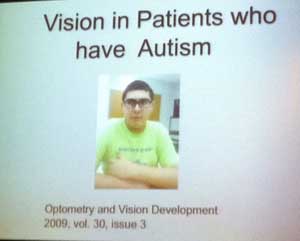Vision and Autism Spectrum Issues

Vision Dysfunctions can impact children and adults with Autism Spectrum Disorder, including Asperger’s Syndrome. Difficulty making eye contact, stimming (moving hands or fingers in front of the eyes), rubbing eyes, holding near vision material either very close or very far away from the eyes, squinting eyes, headaches from visually-directed activities, frustration following a moving target, challenges catching a ball, and overall visual avoidance are commonly observed visual symptoms in the Autism Spectrum/Asperger’s population.
People on the Autism Spectrum can have minimal to significant challenges in one or more of the core Binocular (two eyes) Visual Areas:
- Visual Motor Guidance – visually-directed gross (big muscle, such as throwing a ball) and fine motor (small muscle, such as writing) skills.
- Ocular Motility (eye tracking) – the ability to follow with the eyes (minimal head or body movement) a moving object in visual space, or the ability to follow letters in a word or words on a line of print
- Accommodation (eye focusing) – the ability to see near-centered objects, including words on paper or in a book, with normal acuity (clarity). Eye focusing difficulties will cause near-centered targets to appear blurry.
- Vergence (eye coordination and eye alignment) – the ability to have both eyes aligned (aimed) at the same point in visual space. Eye coordination and eye alignment difficulties will cause Diplopia (double vision), or Suppression (turning off) of the vision in one eye to prevent double vision.
- Visual Information Processing and Visual Perception – the ability to understand, get meaning, recall and remember visual data.
A Functional Vision Evaluation, including eye refraction and eye health needs, provides insight into the visual status and Diagnoses to guide treatment options.
Treatment options may include:
- Corrective lenses and prisms
- Yoked Prism (to alter the perception of visual space, changing visual responses and overall behavior)
- Optometric Vision Therapy/Orthoptics for such Diagnoses as lack of normal Visual Sensory and Motor processing
- Ocular Motility (eye tracking) dysfunctions
- Accommodation (eye focusing) Spasm
- Convergence Insufficiency
- Strabismus (eye turn)
- Amblyopia (reduced visual acuity/clarity
